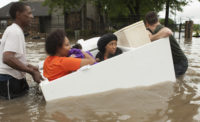University of Alabama Debuts Disaster Response Study Track
More than a year ago, Martha Bidez, a University of Alabama-Birmingham engineering professor, envisioned a new online master’s-degree track to focus explicitly on disaster prevention and systems safety. In early 2010, she began to develop its curriculum and recruit industry experts with experience in high-profile catastrophes to advise and teach. The program, the first such track in the U.S., say university officials, was inspired by a fatal blast in 2005 at a refinery owned by oil giant BP. Now the firm’s latest disaster in the Gulf of Mexico is imparting new momentum to the plans.

The 18-month program, called Advanced Safety and Engineering Management, debuts in August and is geared for engineers and environmental, safety and health professionals. But it is not an engineering graduate degree and does not require an undergraduate engineering degree as a prerequisite. “We’re going to emphasize experiential learning, which definitely includes learning from mistakes,” says Bidez. “We want engineers who design systems and safety specialists charged with protecting operations to share a common language so that system failures, human errors and other factors that can lead to disasters are minimized, if not removed from the equation.”
In addition to the BP disasters, students will study such events as the Tennessee Valley Authority coal-ash spill and the Challenger space shuttle disaster. Among program advisers is Lisa Capicik, regional safety director for Birmingham builder Brasfield & Gorrie LLC. “I gravitate toward the business-systems approach,” she says.
Also advising is John Howard, director of the National Institute for Occupational Safety and Health. “We’re pleased to see a master’s-level degree program launched around the principle that hazards can be prevented best by engineering them out at the initial design stage,” he says. While only accepting 25 to 30 students, the program has received hundreds of applicant. “It’s clear we’re meeting an untapped need,” says Bidez, “and we wanted maximum flexibility for working professionals. There will be only a few times when learners must be at computers.” Courses will include risk assessment and liability, ethical leadership, policy, human performance and engineering design.





